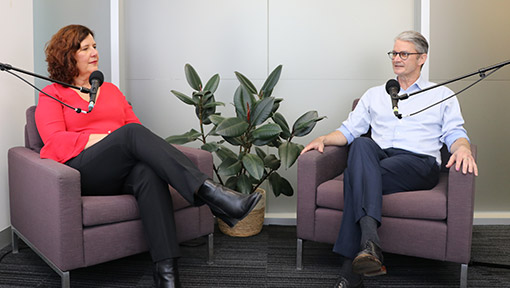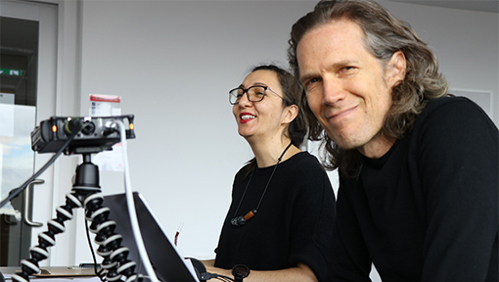
The story of science
If the narrative of the COVID-19 pandemic was told as a fairy tale, it would resemble the literary classic, Goldilocks and the Three Bears. That’s according to Burnet Institute CEO, Professor Brendan Crabb AC, the co-host of the new podcast series, How Science Matters.
The “not too hot, not too cold” nature of the virus is what has led to the scale of the health problem now gripping the world, according to Professor Crabb.
“I don’t think we would have had the debates about whether to shut it down completely, or let it run through the community if it was a little bit worse.”
Professor Crabb leads the Burnet Institute, but is also an Australian microbiologist and infectious disease researcher with a special interest in malaria. He’s been a leading scientific voice behind the Australian government adoption of the ‘go hard, go early’ message, in the event of a coronavirus outbreak.
“You act disproportionately, much stronger than the amount of infection suggests you should. That’s go hard, go early. With the payoff being that you don’t have the infection later on,” he said.
The world has missed a trick
Before the COVID-19 crisis, the United States, and the UK ranked number one and two on the Global Health Security Index, which is a marker of the health security capabilities of 195 countries.
But according to Professor Crabb, it’s these heavyweights that have let us down as we’ve entered a new phase in history.

“There was open discussion, especially in the UK about this idea that maybe we should let the virus go through a community in different ways. That was called herd immunity.”
“When that decision was made, starting in Number 10 Downing Street and in the White House, then what that consigned us to was years more of this problem.”
Science in the spotlight
Over the past two decades we’ve had a number of pandemic scares, with the likes of SARS, MERS, Zika, Nipah and the Hendra virus right here in Australia. But it wasn’t until COVID-19 raged through every corner of the globe that an intense interest in science has been reignited.
Professor Crabb says, “it was pretty satisfying to have leaders in this country, quite genuinely listening to” the science.
It was also the first time that scientists and researchers around the world worked to solve a single issue urgently.
While Professor Crabb credits science for the fact that we’re no longer in the dark ages, he also states that the pandemic has unearthed some tough lessons.
“We’ve learned and hopefully the world is still learning more and more that not only science, but everybody having access to science really matters.”
Sleepless nights, and long days
Since the pandemic began in early 2020, Professor Crabb has had an extremely tough job ahead of him. He says he spent the first six months of this ‘new normal,’ “worried about the direction that the country and the world would take.”
The hardest part about the job? Professor Crabb professes that it’s distressing seeing people lose their parents, brothers, and sisters.
“I find myself lying awake thinking, what more can I do? What more can I do to help influence our government, influence governments in the region, influence scientists, and keep our eye on the ball?”
“To me, it’s very real. You can actually get it, your parents can get it, your friends can get it. So, it’s very real and tangible.”
Hear Professor Crabb discuss the difficult moments in focusing 24/7 on COVID-19 in Episode 1: A year like no other, the pandemic continues.
How Science Matters, is an 8-part podcast series helping us to make sense of the many impacts from the COVID-19 pandemic through science. Hosted by former ABC broadcaster and EGM, Marketing and Communications at Burnet Institute, Tracy Parish and Professor Brendan Crabb, one of the best minds in infectious diseases and global health today.

Produced by Written & Recorded.
Find all episodes of How Science Matters at burnet.edu.au/how-science-matters or wherever you get your podcasts.
